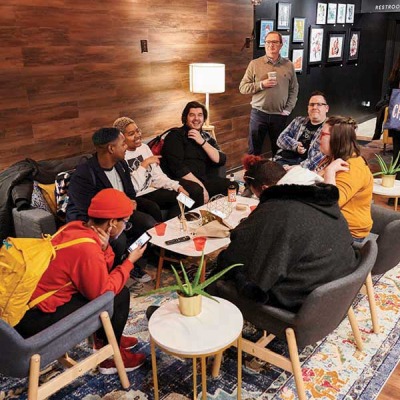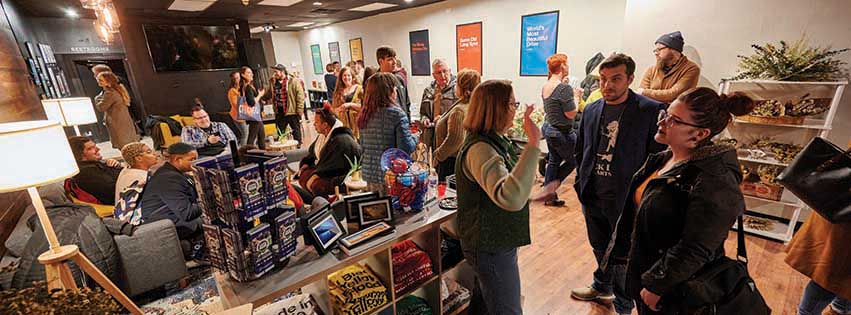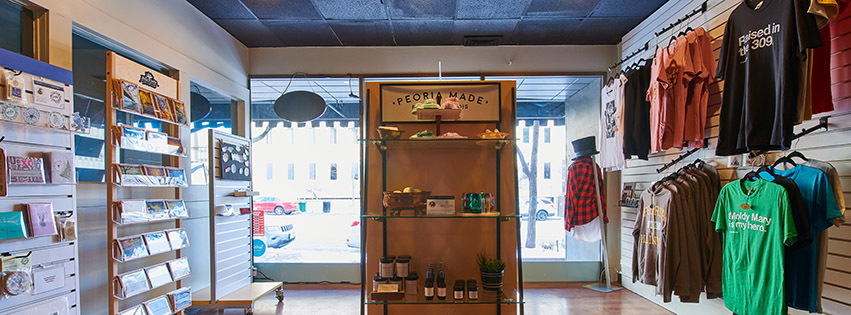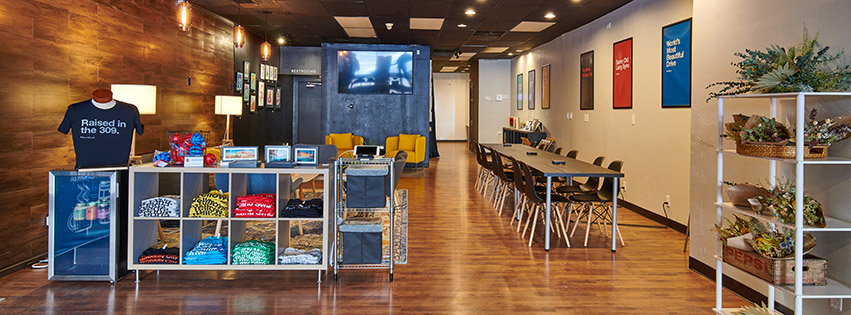Empowering Peoria's Makers

In today’s market, artists, entrepreneurs and makers often go it alone—from start to finish, concept to production. The most successful ones, however, will often tell you they had help: a mentor, an early investor, family members working for free, years of higher education. But what if there was another way to bring them together as a community, to support and provide them with the tools and knowledge needed to succeed?
This is a question Jake Hamann has been asking for some time. And with the launch of Peoria Made, he hopes he is beginning to find the answer… even in the midst of a global pandemic.
Smells Like Innovation
From its location in downtown Peoria, Peoria Made operates as both a retail incubator and visitors center. It’s a program of the Peoria Innovation Alliance, the nonprofit organization Hamann founded in 2019 to support and empower the next round of innovators, entrepreneurs and startups in the Greater Peoria region. During its first few months, Peoria Made successfully hosted a number of educational events, networking opportunities, First Friday activities and more.
Sitting down with Hamann in February 2020, the atmosphere was cheerful and inviting—over a dozen merchants had displays at the front of the retail space, products of Peoria ready to be purchased by the next walk-in patron. In the same room, a visitors center showcased promotional literature about the city and region, a fun selfie backdrop, and even a couple of decorative whiskey barrels. The space was crisp and clean—the stuff of new beginnings. “It smells great in here,” I remark.
“It smells like innovation!” Hamann replies, chuckling.
We sit down in what he calls the “co-thinking lounge,” an area with comfortable chairs and a long table where the general public can purchase a monthly pass to work. Unlike traditional coworking spaces, the lounge was created to foster one-on-one mentoring opportunities, as well as in-depth group discussions. “We’re not trying to compete with the coworking space,” Hamann notes. “This is a little more casual, intended for conversation.”

At the back of the room is a learning lab reminiscent of Project Rocket Science, a similar program once housed at The Nest, a coworking space in Peoria’s Warehouse District. Surrounded by whiteboard walls and full of brainstorming tools, it was created for off-site planning sessions and educational seminars. The finishing touches are also being made on a podcast studio, which would be available to the public to rent.
“The concept had been percolating for seven years or so,” Hamann remarks, describing the project’s evolution and his original vision to launch online as an e-commerce platform. After letting it sit for a while, he came back to the idea last year as an extension of the newly formed Peoria Innovation Alliance. He set about creating the website, offering t-shirts with localized messages: “Made in Peoria, “Raised in the 309” and “Pryor Played in Peoria.” It was instantly popular, and others began to see its potential.
Deborah Roethler, Peoria’s assistant city manager, asked Hamann if he was looking for a physical storefront, and soon she connected him with Tom Dunne, a downtown landlord who was immediately receptive. “He was super-flexible in terms of letting us get in here to renovate,” Hamann explains. The project also caught the interest of Wells Fargo, which donated $12,500 to the cause, and another undisclosed donor who contributed $15,000, allowing Hamann and a small circle of volunteers to build out the space.
Meanwhile, he had connected with the Peoria Area Convention & Visitors Bureau about featuring visitor materials and a branded photo, essentially creating a downtown visitors center. A partnership quickly solidified. Now, they just needed merchants.


A Retail Education
Early in the process of forming Peoria Made, Hamann reached out to a number of local artists, seeking to convene a group to act as consultants for the retail incubator. Nature artist Peggy West stepped up to offer assistance, bringing valuable experience to the project. “She really became the foundation and catalyst for getting the physical [store] going,” Hamann explains. “She sent me some sample consignment agreements, profile forms, inventory forms, that type of thing. We worked closely as a team to modify them to our needs, and then we put a call out for merchants.”
A review committee, consisting of local artists and arts leaders, selected the first 15 merchants according to four key characteristics: inventive, original, artisan and authentically Peoria. On November 29, 2019, Peoria Made launched at 315 Main Street in Peoria. “And we had a really successful holiday season,” Hamann adds.
The initial round of merchants ranged from makers of local products, such as Annie Elaine Bath Co. and 309 Cultures, to up-and-coming artists and designers like Mad Hat Mo and Babin Space. “It is a really, really great mix,” Hamann suggests. Each artist or maker can expect to have their products on display for three months. “We don’t have a lot of room, so we have to make some decisions.” Part of that evaluation involves determining each artist’s needs, their receptiveness to the process of selling their work through the organization, and the degree to which they want to participate in the community.
“We don’t want it to be something where they just park here and aren’t active with it at all. It just defeats the purpose!” Hamann explains. “We want it to be educational for them. They may have never had their stuff in retail, so learning about merchandising, marketing and all those types of things.” The idea was for the educational offerings and the retail component to work hand in hand, each validating and advancing the other.
Every week Hamann’s team meets at Peoria Made to discuss their programming initiatives—attempting to identify gaps in the Peoria market and avoid duplicating programs already underway by the likes of the Greater Peoria Economic Development Council and Bradley University’s Small Business Development Center. They’ve hosted a number of workshops to date, on topics such as branding and the steps to building a successful business. “We’re getting into other stuff, too, around mental health as an entrepreneur or an artist. Where is the next check going to come from? The effects of that,” Hamann explains. “So, just trying to provide a broad spectrum of topics that would help an entrepreneur, whether it be a small business or a scalable startup.”
 The Speed of Change
The Speed of Change
Since our initial interview in February, the situation at Peoria Made has changed dramatically. Looking back at photos from February’s First Friday opening, it almost seems like a foreign world—crowds packed tightly into the intimate space, engaging with artwork, enjoying live music. When the COVID-19 pandemic hit Peoria, Hamann was forced to close the space.
“We shut everything down,” he says over the phone in late March, his voice heavy with the same incredulous sorrow heard from so many others in recent weeks. When does he expect to reopen? “Whenever all this passes,” he offers, adding that when it does, the space will move to a new location on Adams Street. Plans for the podcast studio have also been dropped, as the Peoria Public Library is poised to open its own media center to the public. When they do reopen, Hamann says they will focus efforts on local retail and the downtown visitors center.
While the original concept for Peoria Made was based on an e-commerce platform, most of its products have only been available at the physical location so far. That is also set to change, Hamann explains, and soon people will be able to order items directly on the website. During the pandemic, he hopes to find a way to continue to serve the artists and makers, such as through virtual education courses.
The work of the Peoria Innovation Alliance, including Peoria Made, has not gone unnoticed. Hamann was recently contacted by officials in Kansas City, Missouri, and Rochelle, Illinois, wanting to know the formula to his success. “We’re trying to make Peoria an example for other similar-sized communities,” he notes. “If this stuff can be done here, it can be done anywhere.”
As our community weathers the storm brought by COVID-19, it is more important than ever to support local entrepreneurs, artists and makers. For Peoria Made, that means providing them with the tools, education and resources needed to move online. “We have several campaigns around the ‘Buy Local/Shop Local’ type of stuff, which is great!” Hamann explains. “But that’s not going to change the overall trend of how things are moving to an e-commerce perspective.” With the speed of societal change building to a crescendo, he is taking stock. “If you can’t beat them, join them!” PM
For more information, visit peoriama.de.
- Log in to post comments

